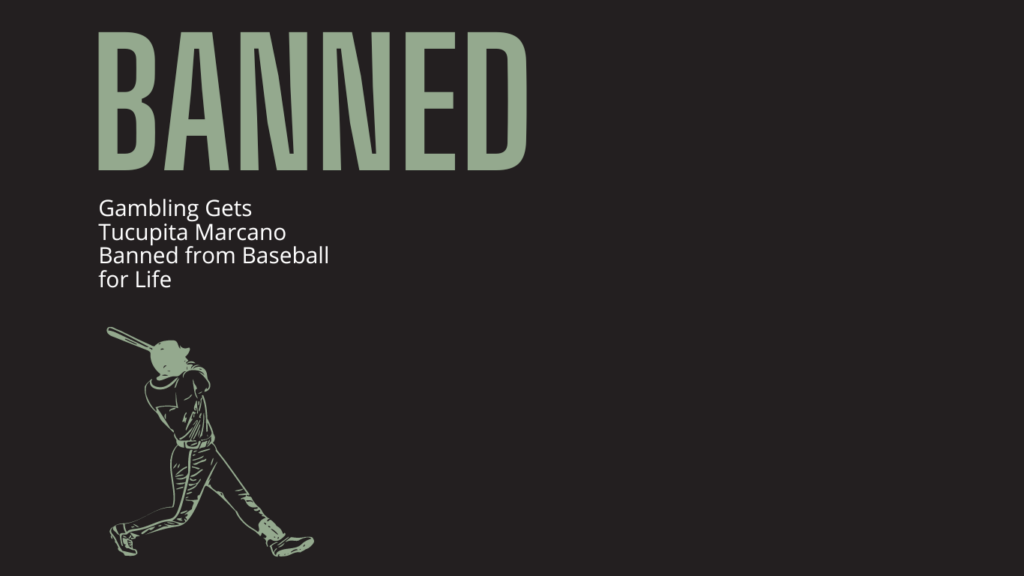Fantasy Sports, Sports Betting, and Gambling: Are They All the Same?
Gambling Gets Tucupita Marcano Banned from Baseball for Life
It happened again. Major League Baseball and gambling have collided and now another MLB player – Tucupita Marcano – has been banned from baseball for life because he placed 387 bets on games valued at over $150,000. Four other players have been suspended/banned but for only a year because their bets were under $1,000.
You have probably seen commercials sponsored by FanDuel and DraftKings inviting you to participate in their Daily Fantasy Sports games and it made you think gambling was legal. However, it is not that cut and dry. In the United States there is a legal distinction between what is construed as sports gambling and betting and fantasy sports.

Skill vs. Chance: The Core Difference Between Fantasy Sports and Gambling
In simple terms, gambling is an activity where people bet on outcomes from real games and luck is a predominant factor in who wins and loses. Fantasy sports is an activity where people use their knowledge (not luck) to bet on outcomes. So, the heart of this differentiation about skill versus chance.
Fantasy sports are often categorized as a game of skill. Participants create teams from a pool of real-life athletes and compete based on the statistical performance of these players in actual games. Success hinges on a participant’s knowledge of the sport, analytical abilities, and strategic decision-making. This skill-based nature places fantasy sports in a different category from traditional sports betting where luck is the key determinant in the outcome.
Another difference, although not a legal one, between sports betting and fantasy sports revolves around engagement and community. Fantasy sports foster a sense of community and engagement among participants. The competitive nature of these leagues, where individuals pit their strategic acumen against one another, creates a social and interactive experience. Many of these platforms offer features such as leaderboards, chat forums, and social sharing, enhancing the communal aspect. Whereas sports betting tends to be a more solitary activity. The primary interaction is between the bettor and the bookmaker, with less emphasis on social interaction and community building.
How Baseball Helped Shape the Unlawful Internet Gambling Enforcement Act (UIGEA)
Initially fantasy sports were simple contests played by friends for bragging rights and sometimes a small amount of money was on the line. So while fantasy sports were gaining popularity, the speed of adaptation was slow at first. Indeed the types of organizations and people that were developing fantasy sports games were on a small scale and not surprisingly baseball, AKA “America’s Favorite Pastime,” had a large hand in how the UIGEA shaped up. For example, these are some of the original fantasy sports games that helped grow and shape this industry:
- Ethan Allan launched a tabletop game – All-Star Baseball.
- Statromatic Baseball launches.
- Professor Bill Gamson at the University of Michigan held The Baseball Seminar where attendees paid $10 to participate.
- The Greater Oakland Professional Pigskin Prognosticators League (GOPPPL) launched in California.
- Daniel Okrent, an attendee of the Baseball Seminar, raised the stakes to $260 in 1979 when he met with friends to draft teams at the La Rotisserie Francaise restaurant in New York. This became known as “Rotisserie Baseball.”
Around 1997 there was a lot of concern over the Internet and how online gambling affected young people; even Congress was worried. The UIGEA wasn’t passed until 2006, but some of the events leading up to it helped shape it.
In 1998 the Major League Baseball Player’s Association went before the court and helped to distinguish daily fantasy sports (DFS) from sports gambling in a legislative session. A key argument: the league was made of ardent fans and posed no threat to the integrity of the game. This distinction has allowed DFS platforms to operate in markets where sports betting is heavily restricted or outright banned.
It was Senator Richard Bryon from Nevada who introduced the amendment to legislation that exempted certain fantasy sports games from the type of gambling that is defined as being illegal in the UIGEA. As long as DFS abide by the guidelines below, they are considered legal:
- Bets in a fantasy sport game cannot be based on a real team.
- The prizes are disclosed up front and are not dependent upon the number of participants or the fees people pay to participate.
- People participate based on their knowledge/skill of an individual player and not a real team.
- The prizes can’t be based on the scores, point spreads, or the performance of a real team.
Maintaining Integrity in Professional Sports
In 1989 Pete Rose received a lifetime ban from baseball because of the gambling he did as a player and a manager from 1985 to 1987. This new batch of illegal gambling puts a new gambling blight on baseball again, but the response from MLB reiterates their focus on integrity and principles:
“The strict enforcement of Major League Baseball’s rules and policies governing gambling conduct is a critical component of upholding our most important priority: protecting the integrity of our games for the fans,” MLB commissioner Rob Manfred said in a statement. “The longstanding prohibition against betting on Major League Baseball games by those in the sport has been a bedrock principle for over a century.”
Understanding the differences between daily fantasy sports and sports betting is crucial for participants, regulators, and stakeholders in the sports entertainment industry. Daily fantasy sports offer a skill-based, community-driven alternative to the chance-driven nature of sports betting, each with its own unique appeal and regulatory challenges. As the industry continues to grow, these distinctions will play a pivotal role in shaping the future of sports engagement and entertainment.
For a deeper dive into this subject please read “U.S. Fantasy Sports Law: Fifteen Years After UIGEA” written by Marc Edelman, John T. Holden, and Adam Scott Wandt by going to: https://moritzlaw.osu.edu/sites/default/files/2022-06/14.EdelmanHoldenWandt_v83-1_pp117-156.pdf

